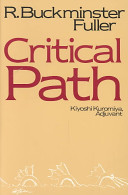Buckminster Fuller's Rules for Knowing if He Was on the Right Path
I assumed that nature would "evaluate" my work as I went along. If I was doing what nature wanted done, and if I was doing it in promising ways, permitted by nature's principles, I would find my work being econom¬ ically sustained—and vice versa, in which latter negative case I must quick¬ ly cease doing what I had been doing and seek logically alternative courses until I found the new course that nature signified her approval of by pro¬ viding for its physical support.
Vherefore, I concluded that I would be informed by nature if I proceeded in the following manner:
(A) committed myself, my wife, and our infant daughter directly to the design, production, and demonstration of artifact accommodation of the most evident but as-yet-unattended-to human-environment-advantaging physical evolutionary tasks, and
(B) paid no attention to "earning a living" in humanity's established eco¬ nomic system, yet
(C) found my family's and my own life's needs being unsolicitedly provid¬ ed for by seemingly pure happenstance and always only "in the nick of time," and
(D) being provided for "only coincidentally," yet found
(E) that this only "coincidentally," unbudgetable, yet realistic support persisted, and did so
(F) only so long as I continued spontaneously to commit myself unreservedly to the task of developing relevant artifacts, and if I
(G) never tried to persuade humanity to alter its customs and viewpoints and never asked anyone to listen to me and spoke informatively to others only when they asked me so to do, and if I
(H) never undertook competitively to produce artifacts others were developing, and attended only to that which no others attended
then I could tentatively conclude that my two assumptions were valid: (1) that nature might economically sustain human activity that served directly in the "mainstream" realization of essential cosmic regeneration, which had hitherto been accomplished only through seeming "right-angled" side effects of the chromosomically focused biologicjical creatures; and (2) that the generalized physical law of precessional be¬ haviors does govern socioeconomic behaviors as do also the generalized laws of acceleration and ephemeralization.
The 1927 precessional assumptions became ever-more-convincingly substantiated by experiences—only the "impossible" continued to happen. I became ever more convinced that I must go on developing artifacts that would make possible humanity's successful accomplishmentit of survival activities so much more logically and efficiently as to render the older, less efficient ways to be spontaneously abandoned by humanity. I resolved never to at¬ tack or oppose undesirable socioeconomic phenomena, but instead committed myself to evolving and cultivating tools that would i accomplish humanity's necessitous tasks in so much easier, more pleasant, and more efficient ways that, without thinking about it, the undesirable ways would be abandoned by society. (I liked the popular 1944 song, "Accentuate the Positive. Eliminate the Negative.")
Notes:
If he was creating artifacts that would help the human race survive, nature, he found, would provide for all his needs.
Folksonomies: nature humanity humanism magic metaphysical
Taxonomies:
/home and garden/bed and bath/bedroom/bedding and bed linens (0.575439)
/family and parenting/children (0.539173)
/education/school (0.484636)
Keywords:
seemingly pure happenstance (0.995137 (neutral:0.000000)), precessional be¬ haviors (0.982624 (negative:-0.207400)), physical evolutionary tasks (0.963844 (neutral:0.000000)), undesirable socioeconomic phenomena (0.958735 (negative:-0.297153)), focused biologicjical creatures (0.942412 (neutral:0.000000)), essential cosmic regeneration (0.941909 (positive:0.611408)), nature (0.941268 (positive:0.330468)), generalized physical law (0.941249 (negative:-0.207400)), efficient ways (0.895489 (positive:0.503269)), Buckminster Fuller (0.813921 (positive:0.560986)), precessional assumptions (0.806048 (neutral:0.000000)), Right Path (0.795204 (positive:0.560986)), human race (0.788704 (positive:0.560986)), relevant artifacts (0.784034 (negative:-0.494679)), vice versa (0.782546 (neutral:0.000000)), alternative courses (0.777695 (positive:0.330468)), new course (0.777360 (positive:0.330468)), artifact accommodation (0.776184 (neutral:0.000000)), possible humanity (0.775967 (positive:0.642667)), negative case (0.773309 (positive:0.330468)), following manner (0.768519 (neutral:0.000000)), infant daughter (0.766614 (neutral:0.000000)), socioeconomic behaviors (0.760408 (negative:-0.207400)), realistic support (0.757872 (positive:0.527859)), generalized laws (0.752528 (negative:-0.207400)), physical support (0.752014 (positive:0.330468)), undesirable ways (0.741132 (negative:-0.566607)), human activity (0.737851 (neutral:0.000000)), survival activities (0.734556 (positive:0.642667)), necessitous tasks (0.728470 (positive:0.480547))
Entities:
Vherefore:Person (0.732507 (neutral:0.000000)), Buckminster Fuller:Person (0.689381 (positive:0.560986)), unbudgetable:Person (0.510602 (neutral:0.000000))
Concepts:
Human (0.911769): dbpedia | freebase | opencyc
Buckminster Fuller (0.875646): dbpedia | freebase | opencyc | yago
Doing It (0.571417): dbpedia | freebase | yago





